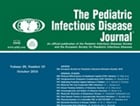Abstract and Introduction
Abstract
Background: The epidemiology and incidence of late-onset blood stream infections (BSIs) in premature infants have been described, but studies describing late-onset BSI in term infants are sparse. We sought to describe the pathogens, incidence, risk factors and mortality of late-onset BSI in hospitalized term infants.
Methods: A cohort study was conducted of infants ≥37 weeks gestational age and ≤120 days of age discharged from Pediatrix Medical Group neonatal intensive care units from 1997 to 2010. We examined all cultures obtained from day of life 4–120 and used multivariable regression to assess risk factors for late-onset BSI.
Results: We found a total of 206,019 infants cared for between day of life 4 and 120, and the incidence of late-onset BSI was 2.7/1000 admissions. We identified Gram-positive organisms in 64% of the cultures and Gram-negative organisms in 26%. We found a decreased risk of late-onset BSI in infants with the following characteristics: small for gestational age, delivery by Cesarean, antenatal antibiotic use and discharged in the later years of the study. Late-onset BSI increased the risk of death after controlling for confounders [odds ratio 8.43 (95% confidence interval 4.42–16.07)].
Conclusion: Our data highlight the importance of late-onset BSI in hospitalized term infants. We identified Gram-positive organisms as the most common pathogen, and late-onset BSI was an independent risk factor for death.
Introduction
Although the incidence of blood stream infections (BSI) in term infants is relatively low, BSI-related mortality and morbidity are high.[1,2] The epidemiology and incidence of late-onset BSIs in premature infants have been described, but studies describing late-onset BSI in term infants are sparse.[3,4] Late-onset BSIs in premature infants are most often caused by coagulase-negative staphylococci (CoNS).[5–7] Group B Streptococcus is the leading cause of early-onset BSI in term infants despite the implementation of intrapartum antibiotic prophylaxis.[5]
Considering that a high proportion of infants admitted to the neonatal intensive care unit (NICU) are term infants, the need for recent data describing the epidemiology of late-onset BSI in this population is dire.[8] We evaluated pathogen distribution, incidence, risk factors and mortality of late-onset BSIs in term infants using contemporary data from a large cohort of hospitalized infants.
Pediatr Infect Dis J. 2014;33(9):920-923. © 2014 Lippincott Williams & Wilkins









